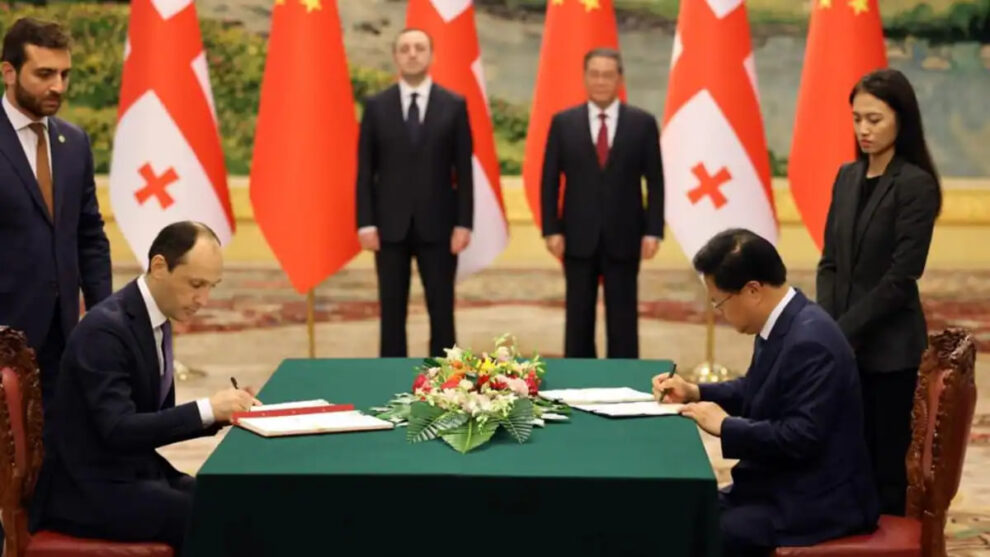Why Georgia Is On China’s Mind
Georgia — the small country of nearly 4 million located in the Caucasus — is having a geopolitical moment amid global fallout from the war in Ukraine.
On a recent reporting trip to the country, my colleague Tamuna Chkareuli and I investigated a project to build a deep-sea port that could place Georgia at the epicenter of a global competition for trade routes and infrastructure between China, Russia, and the West.
Finding Perspective: The project in question is a proposed deep-sea port in the small town of Anaklia on Georgia’s western Black Sea coast, and it has become the site of unlikely geopolitical intrigue that could have far-ranging repercussions for Tbilisi.
The Georgian government has revived the plans after canceling them in 2020. Since Moscow’s full-scale invasion of Ukraine there has been amplified interest from China and Europe in building up trade routes that bypass Russia, which was the main route for overland trade between Europe and Asia.
The leading alternative is through the so-called Middle Corridor, which connects China and the countries of Central Asia to Europe through Georgia and Azerbaijan. But this route currently faces major trade bottlenecks due to lacking or poor-quality infrastructure, with Georgia being one of the largest weak spots.
This is where Anaklia comes in. Georgia currently lacks a deep-sea port, and its current ports face capacity limits amid a surge in trade along the Middle Corridor. The added capacity would allow for far greater volumes of goods to be transported across the Black Sea.
But the Anaklia project is currently caught up in political infighting and geopolitical jostling over who will build it, with competing bids from a collection of European and Chinese companies rumored to be the top contenders.
Why It Matters: Both China and the European Union see the port project as strategic and want their companies to secure the bid.
Analysts and EU officials told me that the companies selected would be a bellwether for Tbilisi’s desire for more Western integration or if it decides to pivot closer toward Russia and China.
The ruling Georgian Dream party has been warming up to Moscow and especially leaning toward Beijing of late. In late July, Prime Minister Irakli Garibashvili inked a strategic partnership agreement with China and gave a glowing interview on CGTN where he praised Chinese leader Xi Jinping and the Chinese Communist Party.
Choosing a Chinese company or Chinese-led consortium for Anaklia could have fallout for Tbilisi’s relations with Brussels. Chasing EU and NATO membership is written into Georgia’s constitution, and the EU is supposed to announce its decision on whether to grant the country membership-candidate status in December.
Georgia’s Economy and Sustainable Development Ministry told me that the deadline for bids has passed and it is currently reviewing several of them. A public announcement for the winner is expected in October.
Expert Corner: A Familiar Face In Kyrgyzstan’s Energy Sector
Readers asked: “We are seeing more and more deals involving Chinese companies investing in power plants in Kyrgyzstan as the country faces an energy crisis. Will these companies be able to deliver?”
To find out more, I asked Chris Rickleton, RFE/RL’s Central Asian correspondent:
“China is indeed looking to be very active in Kyrgyzstan’s energy sector these days, at least on paper. Chinese companies are involved in agreements to construct a series of hydroelectric power facilities in the provinces of Issyk Kul and Jalalabad — which are still very much at the pre-planning stages — as well as a solar farm in Issyk Kul. The quoted capacities for these projects are massive, as are cost estimates, where available.
“Let’s ignore for the moment projects like the Kazarman hydropower plant (HPP) in Jalalabad, which is a seven-year, multibillion-dollar project at minimum, and instead look at the solar farm, which is more realistic in terms of completion (projected for 2025) during President Sadyr Japarov’s current presidential term. The suggested capacity of the project is 1,000 megawatts (1 gigawatt). That is enough to power over half a million Kyrgyz homes and would be sensational for a country with zero major solar projects to date.
“For perspective, the U.A.E company Masdar is looking into building a 200 MW solar farm somewhere in Kyrgyzstan, while a Russian company is building another with 300 MW of capacity. These plans are more in line with the scale of individual solar farms being built in neighboring Uzbekistan, which is also energy-desperate and pursuing solar in a big way.
“The biggest concern for all these projects is corruption and debt accrual. The Japarov government is more dynamic and ambitious than its immediate predecessors, and it has already shown it’s prepared to raise electricity tariffs, which, at some stage, might stimulate investment into the troubled power sector. But it is also authoritarian and light on transparency.
“Chinese companies have in the past been part of the plotline in major Kyrgyz graft cases, and one of those companies, TBEA, is in line to build the Sary-Jaz HPP in Issyk Kul. The fear is that all of these projects have high misuse and scandal potential if they move forward. And don’t be surprised if you hear about giant crypto mining operations springing up nearby.”
Do you have a question about China’s growing footprint in Eurasia? Send it to me at [email protected] or reply directly to this e-mail and I’ll get it answered by leading experts and policymakers.
Three More Stories From Eurasia
1. China’s Hydropower Surge In Kyrgyzstan
Kyrgyz Prime Minister Akylbek Japarov traveled to China on August 16 and signed a new deal during the trip to Xinjiang with the Chinese company Tebian Electric Apparatus (TBEA) to build a cascade of new hydropower plants (HPPs) along the Sary-Jaz River, RFE/RL’s Kyrgyz Service reports.
The Details: It’s interesting to see the contract going to TBEA to build the Sary-Jaz River HPPs given that the last big contract they had in Kyrgyzstan is widely considered to have been a fiasco.
In 2013, the company won the contract to modernize an aging power plant in Bishkek that provided nearly all the heat and electricity for the country’s capital. The modernization, however, failed spectacularly. By 2018, soon after the overhaul was completed, the plant broke down and much of Bishkek was left without heat or electricity in the middle of winter.
The public outcry led to arrests and a trial, which exposed curious Chinese business practices and prolific local corruption behind the failure.
According to court documents and testimony, the Chinese Embassy in Bishkek lobbied hard for TBEA and China’s Export-Import Bank tied their loan for the modernization to the company despite another contractor offering a more competitive bid.
2. Beijing’s Global Security Initiative In Russia And Belarus
Chinese Defense Minister Li Shangfu recently wrapped up a symbolic trip to Russia and Belarus by bolstering military ties with both countries.
But as I reported here, a central focus of the trip was pushing China’s new Global Security Initiative (GSI), Beijing’s sweeping blueprint aimed at presenting foreign-policy alternatives to those offered by the West.
What You Need To Know: The GSI was fully unveiled in February and has since become a central piece of China’s architecture to rival the U.S.-led world order.
A key part of the GSI calls on countries to contribute to global stability and resolve their disputes through dialogue, not force. It also pushes for greater coordination on issues ranging from counterterrorism to increased military exercises and more comprehensive intelligence sharing.
But behind the rosy rhetoric, critics warn that many of the practices advocated through the GSI are designed to create a global system that is friendlier to autocratic regimes and that can erode the current Western-led process.
While in Moscow, Li spoke at the Moscow Conference on International Security that featured a collection of non-Western officials where he took not-so-veiled shots at the United States and called for greater cooperation with China and the People’s Liberation Army.
“The whole point of GSI is trying to put a positive spin on China’s security approach,” Raffaello Pantucci, a senior fellow at the S. Rajaratnam School of International Studies in Singapore, told me. “The Chinese like to have these big, central ideas to organize their views of the world that they can then pitch and sell to other countries.”
3. Chinese Engineers Under Attack
Unidentified militants attacked a convoy of Chinese engineers in Pakistan’s southwestern Balochistan Province, RFE/RL’s Radio Mashaal reported.
What It Means: No Chinese nationals were killed in the August 13 attack, but three security officers were injured in an exchange of gunshots that also killed two militants and injured three others.
The Chinese engineers were working on a project near Gwadar, the site of a strategic port investment by China.
Balochistan is home to a large chunk of the investment within the China-Pakistan Economic Corridor, the nearly $60 billion flagship project within Beijing’s Belt and Road Initiative.
The attack was later claimed by the Baloch Liberation Army, a separatist militant organization that has targeted Chinese nationals several times and warned Beijing not to conclude development deals in Balochistan with the Pakistan government.
Across The Supercontinent
Another BRICS In The Wall: The group of nations known as BRICS — Brazil, Russia, India, China, and South Africa — kicked off their annual summit on August 22.
Among a full agenda, one of the largest topics up for debate is whether to expand the bloc. Some contenders include Iran, Belarus, Egypt, the United Arab Emirates, and Kazakhstan, but all could bring their own complications if selected.
Dollar vs. Yuan: The BRICS summit is also focusing on encouraging the use of alternatives to the U.S. dollar in trade and financial transactions.
The leading alternative has been China’s yuan, although the currency is facing difficulties due to China’s slowing economy — a development that could hamper dedollarization efforts.
Climate Crunch: A water crisis is currently hitting Central Asia and western China, showing increasingly worrying effects for the future.
In the latest development, RFE/RL’s Kazakh Service reports that Kazakhstan’s southern Zhambyl region has declared an emergency due to extreme heat and a lack of water.
Deals, Deals, Deals: In addition to the hydropower deal detailed above, Kyrgyz officials inked 29 agreements totaling $1 billion in value with Chinese companies at a recent business expo in Xinjiang, RFE/RL’s Kyrgyz Service reports.
One Thing To Watch
Axios’ Bethany Allen-Ebrahimian recently reported from Tanzania about the Chinese Communist Party’s first first overseas training school — strong evidence that Beijing is exporting its political model.
The move is a clear departure from China’s other attempts to peddle influence, which tend to be more subtle. It also could be the beginning of a larger trend. Like Eurasia, Africa has been a testing ground for Chinese policies, and there are plenty of spots stretching from Eastern Europe to Central Asia that could be fertile soil for a similar venture.
Source: Radio Free Europe Radio Liberty















